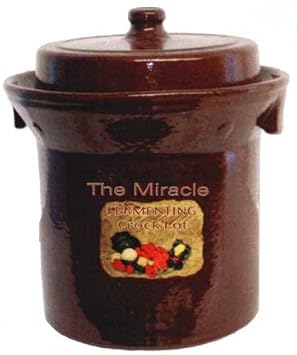Honestly, I've been dreading making this move...throwing stuff to ferment into a mason jar is so quick and easy, but some recent research has shown that mason jars are not making clean ferments. Now I have to figure out how to use the pickl-it and I need to lug out my large Harsch crock.
I bought my Harsch crock about 4 years ago when I first started fermenting, but ended up tucking it away as it was heavy and frankly a bit of a pain to use. I had not heard of pickl-it jars or I probably would have just bought a few of those to start with.
 |
| Harsch Crock via amazon.com |
But, we LOVE sauerkraut in the house and the Harsch is large enough that I can make a huge batch and since I have it, I will use it. If I had known about pickl-it, then I would have just bought their 5 Liter Jar, seen HERE, which is a lot cheaper (and I am hoping easier to use) than the Harsch crock.
(I did find this review that had a helpful side by side comparison for pickl-it and the Harsch crock.)
This change has come as the result of some research done by fellow Nourished Living Network member, KerryAnn at Cooking Traditional Foods. Basically, KerryAnn's research has shown that ferments need an anaerobic environment to create the best healing probiotics for your gut. Mason jars do not provide this, and often breed molds and yeasts into your ferments. If you would like to read more about this here are a few links to her posts.
*Salt and Lacto-fermentation
*Three Important Facts About Fermenting
*Knowing My Lacto-Ferment is Finished
*Pickl-it Question and Answer Video
*Lactic Acid Bacteria vs. Probiotic Pills
*How to Use Pickl-it
*Lactic Acid Bacteria and the Mason Jar
*Controversy: Pickl-it Vs. the Mason Jar
I hope you find these posts helpful and are not discouraged to continue to ferment foods. It is a bit overwhelming leaping into new territory, but you are not alone and my next few Cultured Mondays posts will take you on my journey as I switch over to a new kind of fermenting experience.
I am looking forward to reaping the healthy results of my hard work! So, stick with me and you may find you want to do it too!
(Featured on Healthy Home Economist, Homestead Revival, Real Food Forager, GNOWFGLINS, The Nourishing Gourmet)
The only thing special about the Pickl-It are the airlocks, and you can get them for a couple of bucks each at a home brewery store or website.
ReplyDeleteRobert, Thanks for your comment - the following is taken from Kerry Ann's post:
Delete"According to the makers of the mason jar, they are NOT air-tight unless they are canned with heat in a water bath or pressure canner and there is evidence of a solid seal between the sealing compound on the lid and the glass rim of the jar. The sealing compound just isn’t thick enough and the ring strong enough to create a reliable, completely hermetic (airtight) seal without the use of heat.
Have you noticed how the hermetic jars such as the Pickl-It and the Fido, and even the Grolsch bottles for making water kefir sodas (or homemade beers, but we’ll get to that in a minute) have a very thick rubber ring with a locking lid? That’s because the thickness of rubber combined with a lid held on by tension is necessary to create a hermetic seal. The rings of the mason jars, even when being used with an airlock attached to a lid, just aren’t airtight.
Seriously- ask a professional beer-maker if your mason jar is acceptable for fermentation or storage of beer and they’ll roll their eyes and laugh at you."
Sorry, Sandor is right. Foods have been fermented for thousands of years in varying containers. Mason jars and weights it is for this old gal as this is what I have access and budget for. I have been fermenting for a long time and have never had one spoil. A jar get dropped and broken, yes-spoil? Mo. We have had plenty of good bacteria in them to heal gut imbalances and boy did my family have imbalances.
ReplyDeleteThanks for your comment, Carolyn. At this point in time, I am taking a good, better, best approach. I think that fermenting in mason jars is good, even better with weights, but I think the best would be the Harsch and Pickl-it. I certainly don't want to discourage anyone from fermenting, and I am curious to see if I notice any difference using the Harsch and Pickl-it compared to mason's with weights. Like I said in my post, I agree with you, weights are needed in the mason jars. Just ordered mine from ebay and looking forward to trying them out. Glad to hear that you were able to heal gut imbalances with your mason jars and weights - that is encouraging for me!
DeleteYou will really enjoy the glass weights. An improvement over stones, but I know several who still swear by the stones.
DeleteFermenting the way it has been done for thousands of years is an art form, not a science. Our society is fixated on science and germaphobia. That is what has gotten our food system or whatever one wishes to call it in the state it is in.
I'm glad to hear you have liked the glass weights. I still hold that there is a good, better, best status for fermenting. People are dealing with gut issues that were not around thousands of years ago, thus it does not surprise me that we have had to "discover" a new way to ferment that allows for zero mold tolerance. Maybe most of us can handle a little mold, but it appears that some of us cannot. I plan to try all three for our family to see where we stand.
ReplyDelete